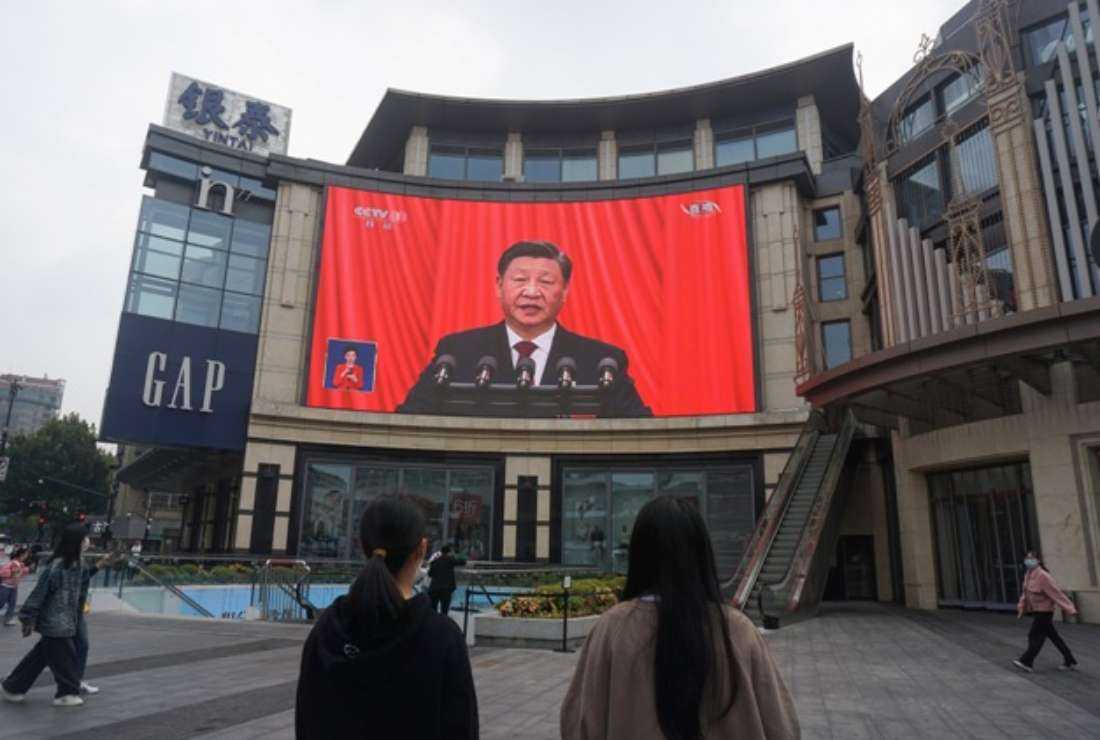It allows the president to see himself as a lifelong leader on the same level as Mao and Deng

People watch an outdoor screen showing the live speech of Chinese President Xi Jinping during the opening session of the 20th Chinese Communist Party Congress in Hangzhou, in China’s eastern Zhejiang province on Oct. 16. (Photo: AFP)
In the past five decades or so, China rapidly transformed itself socially and economically, but paid a high price on its way to capitalism: enormous corruption; growing social gap; violent suppression of popular aspirations; uncontainable pollution of air, land and water; massive urbanization and exploitation, and growing insecurity in the workplaces –tens of thousands died in mines and factories.
Unlike his immediate predecessors, Xi Jinping when he came to power in 2012, managed to concentrate all power in his hands, returning to the rhetoric of the leading and exclusive role of the Chinese Communist Party (CCP).
Xi declared a war on corruption, which allowed him, in a short time, to eliminate his most dangerous political opponents. He consolidated power by strengthening control over the super-rich, bringing them back to the party’s subordination.
With the doctrine of ‘sinization,’ Xi radically eliminates foreign cultural and religious influences, prioritizing control of people’s thought process. He continued on the path of imposing Confucianism as a political ideology for patriotism, also to be exported abroad.
All these together helped Xi to establish himself as the most powerful nationalist and sovereign leader in the world.
Xi’s patriotic rhetoric takes to new heights the narrative of the imperialist humiliation suffered in the era of colonialism.
China must regain its rightful place in the world by excelling in all fields: economic, diplomatic, military, space, scientific, cultural, and sports. That’s the Chinese dream, included in the Party statute (2017) and in the Constitution of the Republic (2018).
In 2049, the centenary of the People’s Republic, China will be a ‘socialist, modern, prosperous, strong, democratic, culturally advanced and harmonious country.’
The dream goes beyond Xi’s mandate limit and allows him to envisage himself as a lifelong leader on the same level as Mao and Deng. The former founded the new China; the latter opened it to the world and to modernity and Xi, the new emperor, will create a united Greater China, including not only Hong Kong and Macau, but also Taiwan, the last missing piece.
The new maritime moves, the New Eurasian Land Bridge, and the (neocolonial) massive presence in Africa and in other continents are tools for a hegemonic project. In this ambitious project, human rights, freedom, and parliamentary democracy are annoying obstacles.
There are diligent ‘experts on China’s affairs’ who explain that democracy and human rights are ‘Western things’ that China does not need because it has better ideas. China’s postcolonial emancipation must also get rid of the Western legacy of democracy.
Whoever promotes democracy in China is considered, at best, an incompetent naive who does not know China. Alas, I have read many of these narratives that entertain the pretension of being intelligent and even elitist, because only a few are gifted to understand China!
In effect, they seem to be a convenient alibi to absolve a totalitarian regime that loathes the idea of contesting.
Presenting democracy as Western is rather pre-textual. Certainly, every European country has people following Marxism, communism, and even the Communist Party. But what is indeed Western is the capitalism, which Deng Xiaoping employed to make China rich, at very expensive prices though, after the tragic failures of Maoist economic policies.
Asia and democracy get along very well. Many Asian nations have noble democratic traditions, with leaders of exceptional value, who have sacrificed their lives for democratic values: from Mahatma Gandhi to Benigno Aquino, to name but a few.
People in Taiwan and Hong Kong, which China considers as its territories, have shown their urge to develop, enjoy and preserve democracy. Democracy thrives in ‘Confucian’ nations such as South Korea and Japan and has gained great dignity in the international economic and political context.
*The views expressed in this article are those of the author and do not necessarily reflect the official editorial position of UCA News.
(This is the second part of a two-part commentary on the situation of China as the communist party’s 20th national congress began in Beijing on Oct. 16.)
